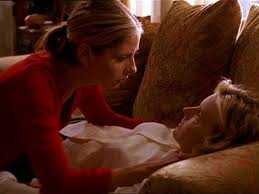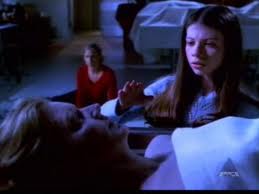
Ioan Gruffudd as Andrew Martin, from left, Sarah Michelle Gellar as Siobhan Martin/Bridget Kelly, Kris Polaha as Henry, Tara Summers as Gemma, Nestor Carbonell as Victor Machado and Mike Colter as Malcolm Ward on Ringer on The CW.
Photo: Art Streiber CW ©2011 The CW Network, LLC. All rights reserved.
This past week marked the triumphant return of actress Sarah Michelle Gellar to the small screen, as her new thriller/drama Ringer premiered on the CW to strong reviews. Ringer has Gellar playing twins Bridget and Siobhan, sisters with very different lives but similarly checkered pasts. The pilot was promising, and media has been abuzz over whether Gellar’s new show can live up to her greatest glory—that is, Buffy the Vampire Slayer.
Buffy—which, full disclosure, also happens to be my favorite show of all time—was a dubiously-titled seven-season masterpiece that developed a rabid cult following of sci-fi geeks, teenage girls, and television connoisseurs (I was in at least two of those groups). Creator-writer-director Joss Whedon (Angel, Firefly, Dr. Horrible’s Sing-Along Blog) imbued what could have been a preposterous premise with heart and humor. Surrounded by vampires, demons, and numerous apocalypses, Buffy, equipped with superpowers, and her friends surprisingly remained real, relatable people, facing challenges that we can all understand.
In the midst of all the SMG-related news, I decided to revisit what was probably the most affecting episode of the entire series. Season 5, Episode 16, entitled “The Body,” deals with the immediate aftermath of Buffy’s mother’s tragic death. Originally airing in 2001, it remains one of the most poignant and realistic representations of loss and grief in television history, and is hailed by critics as not only a great Buffy episode, but also as one of the best TV episodes of all time.

Buffy tries to revive Joyce after discovering her body
Notably, despite the supernatural bent of the show, Joyce Summers (Kristine Sutherland) dies of natural causes: an aneurysm resulting from a tumor operation. It is unexpected, and it is Buffy who, coming home one afternoon, discovers her mother lying on the couch. The title “The Body” refers to the difficulty Buffy and her friends face in comprehending the loss of Joyce, and her transition from a warm, loving, living person to simply a lifeless body. Numerous references to “the body” are made throughout the episode. When Buffy calls 911 after discovering her unresponsive mother, she tells them, “She’s cold.” “The body’s cold?” the operator asks. “No, my mom,” Buffy insists. After the paramedics have come and gone, Buffy’s friend and mentor Giles (Anthony Stewart Head) arrives at the house. When Buffy sees him bend over Joyce to try to resuscitate her, she cries out in a hysterical pitch, “We’re not supposed to move the body!” and immediately falls silent, shocked at her own words.
The moments after the paramedics leave Buffy’s house, having informed her that her mother is dead, are stark, impressionistic, and profoundly moving. A single handheld camera follows Buffy as she wanders aimlessly from room to room. Sunlight streams in from the windows. Wind chimes tinkle. In the distance, Buffy can hear children playing and laughing. Numbly, she focuses on objects she encounters: the giant numbers on the phone buttons, the paper towel she presses on the carpet where she got sick. The camera’s focus moves in and out. The scene, like the entire episode, is entirely devoid of music, and the silence feels oppressive, unreal.
“I don’t understand how this all happens. How we go through this. I knew her, and then she’s—there’s just a body… It’s stupid! It’s mortal and stupid.”
The reactions of Buffy’s friends represent the varied ways people deal with their grief. Willow (Alyson Hannigan) agonizes over what shirt to wear to the coroner’s office, panicking because she cannot find the blue sweater that Joyce had once said she liked. Xander (Nicholas Brendon) searches for someone or something to blame, and in a moment of frustration punches a hole in the wall. Anya (Emma Caulfield), a former demon who throughout the series struggles to learn how to be “human” (usually to humorous effect), becomes upset and says in a plaintive tone, “I don’t understand how this all happens. How we go through this. I knew her, and then she’s—there’s just a body… It’s stupid! It’s mortal and stupid.”
The entire episode is particularly striking when contextualized within the series. Buffy is basically a superhero; she fights the forces of evil, saves the world, and deals with death on a regular basis. Yet in dealing with the death of her own mother, she is as lost and confused as any of us would be.

Buffy and Dawn view their mother’s body
The episode ends with Buffy and her younger sister Dawn (Michelle Trachtenberg) in the morgue, where Dawn is viewing Joyce’s body. Dawn asks, “Is she cold?” Buffy tells her, “It’s not her. It’s not her. She’s gone.” “Where’d she go?” Dawn asks, and reaches to touch Joyce’s face, the screen cutting to credits before her fingers make contact. This spare exchange and abrupt, unsatisfying ending say so much about the deep and painful reverberations resulting from loss. Though the scene represents an acceptance on Buffy’s part that her mother is indeed gone—that the body is just a body—it also suggests the volumes of pain beneath the surface, and that no matter how time passes, the hole left by their mother’s departure will probably never be filled.
It remains uncertain whether Ringer has the potential to live up to Sarah Michelle Gellar’s other hit TV show—I’ll definitely be watching. In the meantime, though, I highly recommend “The Body” for anyone interested in issues of grief. As a stand-alone episode, no familiarity with the series is necessary, and the writing, direction, and performances are all extraordinary. You can view this thoughtful, well-crafted perspective on profound loss on Hulu Plus and other online sources. Just make sure you have tissues standing by.

 “Ringer” by executive producers Peter Traugott and Pam Veasey
“Ringer” by executive producers Peter Traugott and Pam Veasey



 Funeral Favors Offer Visitors a Tangible Memento
Funeral Favors Offer Visitors a Tangible Memento
 “Comeback” by Prince
“Comeback” by Prince















